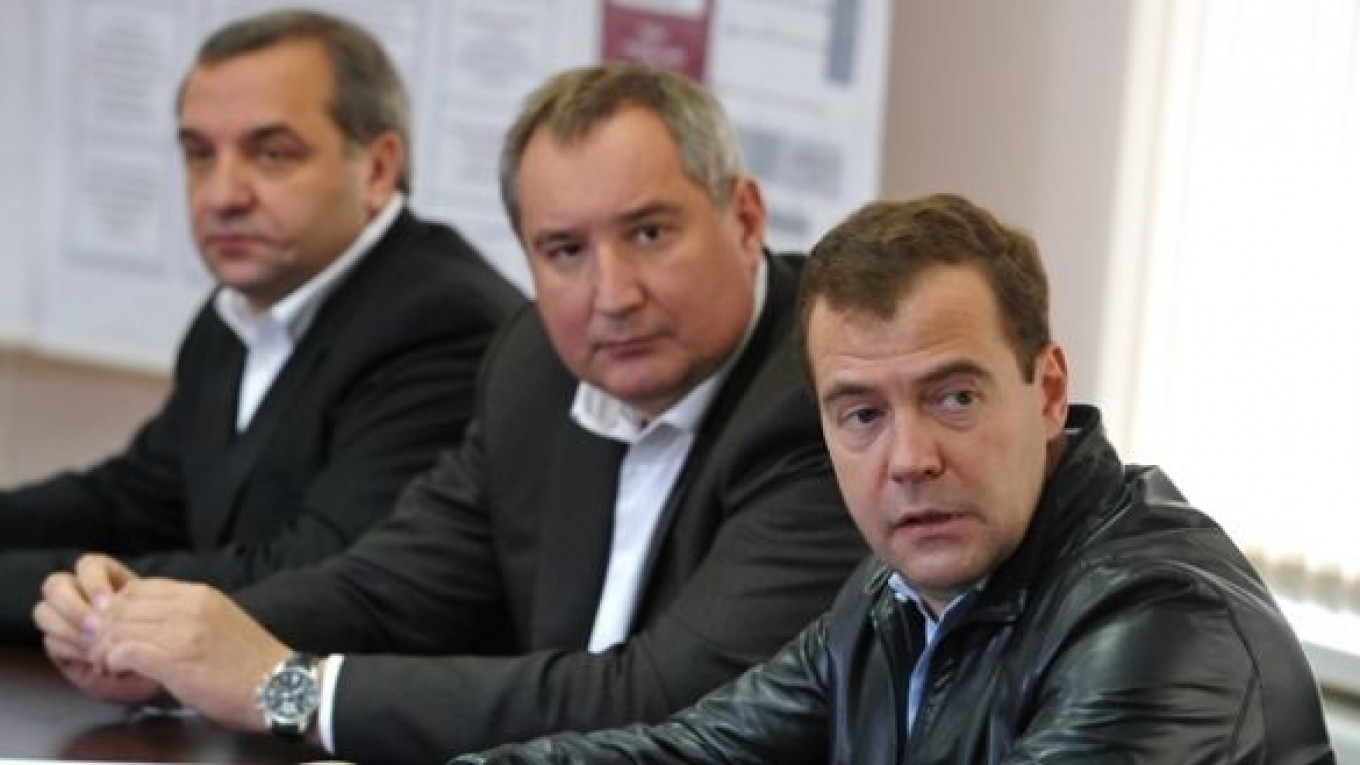Russia's ambitious program to revamp its army and fleet has already produced a "missile defense killer" that "neither modern nor future American missile defense systems will be able to stop," Deputy Prime Minister Dmitry Rogozin said Friday at a lecture organized by the ruling United Russia party.
"We live in a forest full of predators. We should not grieve over this or blame others. This is reality. This is how it is and this is how it will be," said Rogozin, speaking to a group of future United Russia leaders undergoing training as part of the Civil University project.
Civil University, coordinated by State Duma Deputy Andrei Isayev, is an initiative of the ruling party to train future leaders by offering a series of seminars and public lectures led by top party officials. Prime Minister and head of United Russia Dmitry Medvedev has already given such a lecture, as well as Duma speaker Sergei Naryshkin.
Deputy Prime Minister Dmitry Rogozin calls Russia a “magnet for predatory aspirations” due to its abundant natural resources.
Describing Russia as a natural "magnet for predatory aspirations of certain states and organizations" due to its abundance of natural resources, the deputy prime minister quoted the ancient adage that "if you want peace, prepare for war."
Rogozin did not specify what states and organizations might be targeting Russia, but he cited U.S. plans to install missile defense assets in Eastern Europe as one of the biggest challenges.
On Thursday, Russia conducted the first flight test of the new intercontinental missile designed to penetrate any current or future U.S. missile defense systems.
According to Rogozin, there is currently no missile defense system capable of stopping this "missile defense killer" from "hitting the bull's-eye."
Rogozin's comments come as the latest reminder of Russia's wariness about U.S. plans to install missile interceptors in Romania and Poland, a constant bone of contention between the two sides, with Russia regularly threatening to deploy its Iskander surface-to-surface missiles in nearby Kaliningrad.
Another threat to Russia, according to the deputy prime minister, comes from the U.S. Prompt Global Strike initiative, an effort to develop a system that can deliver a precision conventional weapon strike to any target in the world within one hour. Once operational, such a system would diversify the means of deterrence available to the U.S.
In order to counter this and other threats, Russia has adopted a large-scale state armaments program with a planned budget of more than $600 billion for a complete overhaul of the military. The program received harsh criticism from Alexei Kudrin, who served as Russia's finance minister for 11 years before resigning over a disagreement with the increase in defense spending.
"These people have forgotten that the arms race was one of the reasons for the demise of the Soviet Union," Kudrin said in a recent interview with Spiegel.
Apart from military threats, Rogozin also cited social networks as a technology posing a new set of challenges.
"All 'likes,' all buttons that people click on [on social networks] are analyzed to determine the users' preferences. This unites people of oppositional views into separate groups that can then be manipulated," Rogozin said.
A special department exists within the U.S. State Department to deal with these issues, he said, adding that he'd met with the head of this agency, and that its objective was to use social networks to achieve U.S. military means in a nonmilitary manner.
A long-standing ally of Putin, Rogozin is known for his nationalist rhetoric, and he revived the pro-Kremlin, conservative Rodina party last September to act as "Putin's special force."
The Civil University initiative is set to continue, with Patriarch Kirill and Federation Council Speaker Valentina Matviyenko among the future speakers.
Contact the author at i.nechepurenko@imedia.ru
A Message from The Moscow Times:
Dear readers,
We are facing unprecedented challenges. Russia's Prosecutor General's Office has designated The Moscow Times as an "undesirable" organization, criminalizing our work and putting our staff at risk of prosecution. This follows our earlier unjust labeling as a "foreign agent."
These actions are direct attempts to silence independent journalism in Russia. The authorities claim our work "discredits the decisions of the Russian leadership." We see things differently: we strive to provide accurate, unbiased reporting on Russia.
We, the journalists of The Moscow Times, refuse to be silenced. But to continue our work, we need your help.
Your support, no matter how small, makes a world of difference. If you can, please support us monthly starting from just $2. It's quick to set up, and every contribution makes a significant impact.
By supporting The Moscow Times, you're defending open, independent journalism in the face of repression. Thank you for standing with us.
Remind me later.






